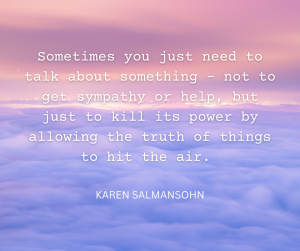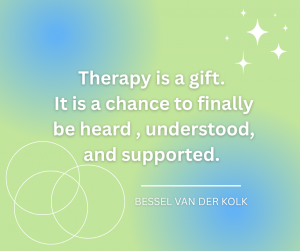 There are several misconceptions around therapy; with many people believing that therapy is only for people who are in a crisis situation or extreme distress. This is not true at all and from my experience, most people struggle on for much longer than they probably should before reaching out for support. Therapy is for anyone who feels they need help, regardless of how severe their issues may seem. There are no hard and fast rules about how much you need to be struggling before you contact a therapist! We all deal with and process life events differently and what may not seem like much of an issue for one person, may in fact be weighing extremely heavy on another.
There are several misconceptions around therapy; with many people believing that therapy is only for people who are in a crisis situation or extreme distress. This is not true at all and from my experience, most people struggle on for much longer than they probably should before reaching out for support. Therapy is for anyone who feels they need help, regardless of how severe their issues may seem. There are no hard and fast rules about how much you need to be struggling before you contact a therapist! We all deal with and process life events differently and what may not seem like much of an issue for one person, may in fact be weighing extremely heavy on another.
Many of my clients have never had therapy before, so my aim is to make them feel as comfortable as I can right from our very first contact. Most of my enquiries come via email, either through my website or via my directory listings with the BACP or The Counselling Directory. I always aim to reply promptly, usually within 24 hours but often I reply as soon as the enquiry comes in. I am conscious that sometimes my email goes into a prospective client's spam folder so it's always best to check if you haven't received a reply within 24 hours. If a contact number has been provided, I usually send a text as well just to alert the sender that there will be an email in their inbox/spam from me.
Your Enquiry
I want to break this part down as enquiries often come in many shapes and forms! I understand that knowing what to even put in an email when you are enquiring about therapy is a bit daunting. How much detail should you go into? What if you don't even really know what your issue is, just that something feels off, or you feel stuck in some way? I've had many different types of email over the years from prospective clients, sometimes going into a fair bit of detail about their issues, other times stating that they need some help but can't really tell me what the main problem is, just that they aren't feeling very good about life.
Honestly, there is no right or wrong here. As a therapist I understand that pouring your issues on to a page and sending it to a complete stranger feels like a bit of a weird thing to do! At this stage, I just need a brief outline of the main issues so that I can determine whether I am likely to be able to support you and move forward with the process. So maybe a just a short paragraph explaining if there's been a particular life event that you're struggling to cope with, or maybe a little bit of background if the problems have been going on for some time. It's good for me to know at this stage if you have been diagnosed with any mental health conditions such as GAD (Generalised Anxiety Disorder) PTSD, Depression etc. but this will be covered during the initial assessment stage which comes next.
Initial Phone Consultation
On receiving your email enquiry, the next step is for us to arrange an initial phone consultation. This usually lasts around 20 minutes and is where I will ask you more detailed questions about your history and why you've reached out for counselling. This will form my initial assessment and again, there are no right or wrong answers but its important to be as honest as you can so that I can make an informed professional judgement about whether I feel I have the knowledge, skills and experience to work with you. It's important to understand that whilst I have worked with clients experiencing a wide range of issues, I am not necessarily an expert in everything! Sometimes, particular issues require quite specialist care or a different type of therapy and I will be honest with you if I feel that I am not the best person to be supporting you. I will always endeavour to refer you to colleagues who I know personally if I feel they may be a better fit for you and hold the relevant training, skills and qualifications, but in cases where I am unable to do this, I will provide links to online directories so that you can choose another therapist to work with.
As part of my initial assessment, I will ask a couple of questions around risk. This is nothing to be worried about - it is so that I am fully aware of all the information about your current state of mind. Making sure I am the right person to support you is very important and I take my commitment to client safety very seriously.
I will explain to you my approach to therapy and how I work, detailing my professional qualifications, boundaries such as my fee, payment policy and briefly explaining confidentiality. (This will be covered in greater detail in our first session). There will be lots of opportunity to ask questions and get a flavour of me and how we may work together. My aim is that you feel as comfortable as possible and the feedback that I've received over the years is that people have found me to be down to earth, warm and easy to talk to.
Booking Your First Session
On our call, we will discuss what days and times may work for us both and book in your first session. This may be face to face or online, depending on your personal preference and location. I am happy to be able to support clients from anywhere within the UK via Teams. This enables me to support more people even when they may live far away.
After our phone consultation, I will follow up with an email, confirming what we discussed on the phone, with details of the date and time of our first session, the location of my therapy room (if working face to face) and I will attach a copy of my Counselling Contract for you to read and check. There is no need to print this as I will bring two copies to our first meeting for us to both sign and we will keep a hard copy each.
Attending Your First Session
Most people will feel a bit nervous about the first session. This is totally normal! On arrival, I will invite you to make yourself comfortable in my warm, cosy counselling room and we will firstly discuss the contract, making sure you understand everything that is covered. One of the most important aspects of our first session is that I am completely transparent about how your data and the content we talk about together is handled. I will explain confidentiality and its limitations, my monthly supervision sessions, and go through the finer details about how the sessions work. There will be lots of opportunity to ask questions and together we will identify your goals for therapy and what you would like to get out of it.
It's often daunting to know where to begin, so the main thing to keep in mind is that we will go at your pace. There is no right or wrong place to start, often we start with how you are feeling in this moment as we begin, and go from there.
As the session flows, we will start to get a sense together of the main issues and by this point, hopefully you will start to relax and feel able to talk freely. It's important to note that for some, it can take time to build the trust between us before they feel comfortable sharing their personal history - and this is okay! For other's, they have been holding on to things for a while and it can feel like a relief to finally be telling someone how they have been feeling and everything comes tumbling out - again this is perfectly okay!

Therapy is a deeply personal and unique thing to experience. No two clients are ever the same, and how we experience life is totally subjective. It really is just two humans, sitting together and talking and my aim is to create the right environment and conditions for you to feel safe enough to share how you're feeling.
At the end of our session, we will book in the next session at a convenient day and time for us both - and that's it! You are now on your way towards personal healing and growth. Something I will always tell clients, is that it is possible as we start to open things up, that you may feel a bit wobbly after our early sessions, and this is totally normal. Often clients are talking about things that they may have kept to themselves for a number of years and bringing things out in the open can feel unsettling at first. But as we develop our relationship together, one that I hope will be based on trust and mutual respect, this gets easier. I will never force you to talk about things you don't feel ready for - and it's important to understand that as my client, you have total autonomy and control over what you chose to discuss. An analogy I like, is that you are driving the car, I am the passenger beside you, along for the journey. Or as the great existential therapist Irvin Yalom quotes in his book, The Gift of Therapy:
"I prefer to think of my patients as fellow travellers, a term that abolishes distinction between 'them' (the afflicted) and 'us' (the healers)."
We are in this together.

If you would like to book a session with me, please don't hesitate to reach out. You can email me -
hello@therapywithjanine.co.uk
